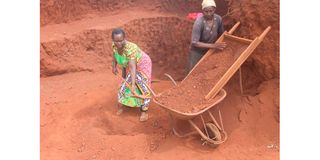Mining: Women paraded naked in search of 'stolen' gemstones

Women at Mbudzi village in Jaribu, Kilifi County, mining iron ore. In Taita Taveta County, the severity of the working conditions women face in the male-dominated industry has hindered them from venturing into mining.
What you need to know:
- Severe working conditions most women face in the artisanal and small-scale mining in Taita Taveta has hindered them from venturing into the traditionally male-dominated industry.
- Most women in gemstone mining areas mainly work as casual labourers and are often vulnerable to gender discrimination, exploitation and health issues.
- In Kasigau, an investor in 2016, subjected female workers to indecent searches to prevent them from stealing her gemstones.
The severity of the working conditions facing most women in the artisanal and small-scale mining (ASM) sub-sector in Taita Taveta has hindered them from venturing into the traditionally male-dominated industry.
A recent survey by Oxfam, shows that women comprise only 15 per cent of the 10,000 ASM workforce in the county.
Situated along the Mozambique Belt, Taita Taveta is endowed with high and middle-value gemstone vast variety including ruby, Tsavorite (green garnets), red garnets, sapphire, tourmalines and rhodolites among others.
However, residents, especially women and children do not benefit from the vast resource.
A majority of women in gemstone mining areas mainly work as casual labourers and are often vulnerable to gender discrimination, exploitation and health issues.
Female workers
In Kasigau, for example, an investor, in 2016, subjected her female workers to indecent searches to prevent them from stealing her gemstones.
Every evening, more than 50 female workers drawn from the local village, underwent the humiliating act.
A victim tells nation.africa that the investor would first threaten them with a gun before parading them naked to search for her precious stones from them. In some instances, those who refused to comply were assaulted and threatened not to report to authorities.
"We decided to leave the job because we were not being paid and also the working condition was not favourable. She used to cook our food in a rusty metal drum," the victim says.
She says their quest for justice was cut short after the perpetrator threatened and harassed them to withdraw a case they had filed at a Voi court.
Identity cards
She disclosed that the investor gave some victims Sh3,000 before promising them more goodies once the court acquitted her.
"I was naive and did not know what was going on. We blindly gave out our identity cards and signed some papers and to our surprise, we were later informed that the case was withdrawn," she narrates.
To work in the mines, some women have to buy their entry through a sexual transaction.
Many women who have spoken to nation.africa resonate with their colleague's personal experiences.
Ms Esther Wanjala says the lack of proper security at the mining zones hinders women from venturing into mining activities.
"Sometimes, women are forced to give in to their (men) advances to get favours like gemstone buyers, jobs and excavation tools," she says.
A report released by the Kenya National Commission on Human Rights (KNCHR) in 2018, says locals, especially women and children in the county, face human rights violations in the mining sites.

Kenya Lands Alliance CEO Faith Alubbe during a 2020. She says some mines have been grabbed by influential investors out to mint the resources at the expense of locals.
The report further notes that residents have not benefited from the resource due to infringement of gender, land, environmental, labour and children rights.
To tap into the potential of the sector, a programme dubbed Fair for All: Improving value chains at scale has been launched in the county.
Implemented by Transparency International Kenya in partnership with the Kenya Land Alliance (KLA) with financial support from Oxfam in Kenya (OiK), the program also targets miners in Turkana and Kwale counties, where there is gold and mineral sands respectively.
Oxfam Programmes Director Blandina Bobson, says many women work in artisanal and small-scale mining but with little support from government.
She says the programme aims to empower women to achieve social and economic benefits from mining.
Ms Bobson states that there is a need to integrate gender equity and equality principles into the sector to boost the skills of women artisanal miners, challenge gender discrimination, sensitise them on existing laws to alleviate some of the barriers that hinder their participation in mining.
"Women working in mining sites should be treated in a dignified manner, paid accordingly, and given the right working gear," she says.
Concerning land rights, gender disparity in land ownership in the county is a key concern, with women getting less than two per cent of the title deeds issued between 2013 and 2017 compared to 97 per cent of men.
Influential investors
Ms Bobson says the patriarchal cultural perceptions disadvantages women as they do not benefit from land compensation, which in most cases is provided to men.
Kenya Lands Alliance Executive Director Faith Alubbe, notes that some of the mines have been grabbed by wealthy and influential investors, who are out to mint the resources at the expense of the locals.
Ms Alubbe says the five-year programme will ensure locals get their fair share of benefits as enshrined in the Constitution.
"Some are even grabbing land in this county as the government watches. There is no need to have good laws that are not benefitting the locals," she said.
She says mining companies must ensure residents get their fair share of benefits and give their workers appropriate salaries and working gear.





